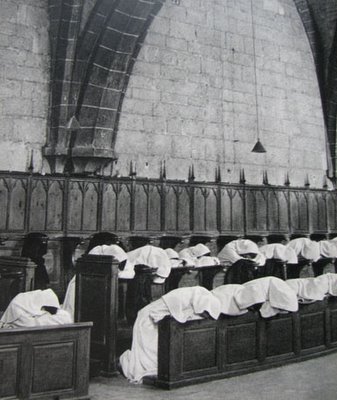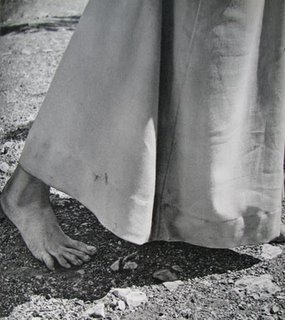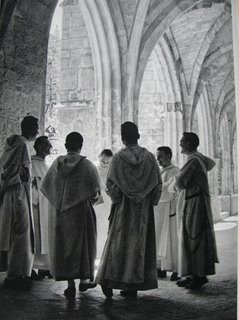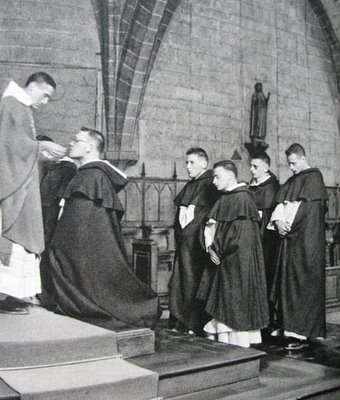Blessed Jordan of Saxony (Final Part)
 His Traits: Love for Novices and Zeal for Recruits
His Traits: Love for Novices and Zeal for RecruitsIn July 1223, Jordan writes one of his earliest letters to Diana asking for her prayers “in begging the Lord to deign to move the hearts of the students [of Padua] and draw them to himself, for their own salvation, the glory of God and the Church, and the increase of our Order.” This was to remain one of his prime concerns (and successes) in his Generalate.
We have already seen his success in this field. In Padua he wrote to Diana that he gained 10, then 23, then 30. At Paris in 1226 he received 21 friars in 4 weeks. This does not include Bologna because he recounted the catches to Diana personally. On one occasion, he received so many that there were not enough habits to clothe the novices in, so the brethren gave up parts of their habits to clothe the new novices! Many of these were well-educated, the kind of men needed by the fledgling Order but not all were. There is a beautiful story about Bl Jordan told by a Thomas of Cantimpre that gives me consolation in this regard:
He reports that at one time Bl Jordan received 60 in Paris. However, they were “so uneducated that most of them… could scarcely manage even to read a single lesson at Matins, even after they had been taken over it repeatedly.” As such, the “brethren challenged [Jordan] about this at the General Chapter but he was filled with the Holy Spirit and said ‘Let them be! Do not despise one of these little ones. I tell you that you will see many of them, nearly all of them, in fact, turn out to be splendid preachers, through whom the Lord will work more for the salvation of souls than he does through many more intelligent and educated men’”. And it was so.
The words attributed to Jordan are redolent of Scripture, something we see also in his letters. And he looks upon his novices like a true father and truly loves the brethren. One of the most touching accounts in the Vitae Fratrum tells of how this tireless itinerant preacher upon arriving in a convent would first greet the brethren and then visit the sick and “cheer them” and then he would “gather [the novices] round him and talk familiarly with them, and if any were downcast or beset with temptations he would very soon gladden them.” Many tales are told of the ways he helped novices who were tempted to leave the Order.
One can imagine Jordan doing this when in a letter to Diana from Magdeburg in September 1225, he says: “I was pleased to find this priory so full of good will and the entry of several novices into the Order there rejoiced me not a little”.
Moreover, Jordan so desired the admission of students to the Order that he did all he could to help and accommodate them. Indeed, he even sometimes had to sell his books in order to pay off the debts of students entering the Order!
Most famously, Jordan encouraged joy and laughter among his novices. There is a lovely story in the Vitae Fratrum:
“When on his way home to his convent with a fresh batch of novices, as they were all saying Compline together, one of them fell to laughing, and the rest catching on joined in right heartily. Upon this one of the blessed Master’s companions made a sign for them to be quiet, which only set them off laughing more than ever. When the blessing had been given at the end of Compline, the Master turning to this friar rebuked him sharply: ‘Brother, who made you their master? What right have you to take them to task? Then addressing the novices very gently, he said, ‘Laugh to your heart’s content, my dearest children, and don’t stop on that man’s account. You have my full leave, and it is only right that you should laugh after breaking from the devil’s thraldom, and bursting the shackles in which he held you fast these many years past. Laugh on, then, and be as merry as you please, my dearest sons.’ They were all very much relieved on hearing him say so…”In this story, we see his gentleness and love for his novices, calling the novices his ‘dearest sons’ but we also see how he truly sees the Order as the place of salvation. The lore of the Order sees the habit very much as a sign of this salvation. This clearly drove Jordan's zeal for souls and the increase of the Order.

His Manner of Prayer
The Vitae Fratrum tells us “he generally knelt with his body upright, and his hands clasped devoutly, and he did this without ever bending forward, or sitting down, or leaning to either side, during such time as one could have easily walked about 8 miles. This was specially his custom after Compline, and again after Matins… no matter whether we were staying at home or had just returned from a wearisome journey. Meanwhile he wept bitterly… Those who watched him at such times often heard him crying in a loud tone, and he would let the great tears course down his cheeks while offering up the holy mysteries [Mass]… sometimes his sermons and instructions were choked with sobbing… he devoted himself to contemplation, from which he derived great peace of soul. As he plodded his weary way along the roads it was his unvarying custom to busy himself with prayer and contemplation, unless he were saying the breviary with a companion, or conversing on some profitable topic… He frequently walked along about a stone’s throw ahead singing some favourite melody, such as the Salve Regina or the hymn Jesu nostra redemption. These spiritual raptures were often the cause of his straying from others, who used to have to go in search of him… If any were downcast he would cheerily remark: ‘Never mind, brothers, it is all part of the way to heaven.’” There are clear resonances of St Dominic in all the above.
Noteworthy is his wisdom, prudence and moderate attitude to bodily mortification. He tells Diana in 1223: “Strive with the greatest care to apply yourself not so much to corporal penance, in which the measure of reason and discretion can easily be exceeded; but rather in virtue… apply yourself to devotion and its works. Let your heart be pure, your life innocent, let there be unity of customs among you, peace and concord, unbroken charity, the loving humility which preserves all other virtues…” And again in 1225 he says to her: “Do not abstain too much from food, drink and sleep, but act with discretion and patience in all things.”
These are to be hallmarks of his spiritual wisdom which are still relevant today.
His Affection and Love; His letters to Diana
This same cheerfulness and trust in God is seen in his letters to Diana. In October 1225, he mourns the loss of Brother Henry of Cologne but his letter is full of hope and encouragement. He says: “If you find things a burden, or are discouraged or weak say to him… ‘Draw me after thee, we will run in the fragrance of thy perfumes.’” Indeed he very much sees sadness and sorrow in this life as part of the human condition and he encourages Diana (and us) to be humble and patient in enduring these but to look ahead to the joy of the kingdom, which he often describes in nuptial or banqueting terms.
Indeed, his letters are almost always full of spiritual direction and counsel. As Hinnebusch says: “Jordan sought to awaken in Diana and her sisters a virile spirituality founded on love of God, mutual charity, peace, joy and love of the Cross.”

In the letters to Diana, Jordan repeatedly shows his warmth and affection for her and her sisters in St Agnes’ convent. Clear too is his love for Henry whom he calls “my sweetest friend, my brother who loved me so much, my dearest son”. To Diana, he says such things as: “For you are engraven upon my inmost heart that so far from being able to forget you, on the contrary, you are in my thoughts all the more frequently, since I know that you love me with sincerity and with all the depth of your heart” or “I suffer from the hurt in your foot about which I have learnt.” Clear too is the longing he has to see her in person. Several times he writes: “Since, dearest daughter, I am not permitted to see you with my bodily eyes as often as you would wish and I should like…” and again, “the longer we have been absent from each other, the greater the mutual desire we have to see each other.” These are marks of Jordan’s humanity and holiness.
We must not see in these letters an expression of erotic love. There is something purer here. As many writers have pointed out, in Jordan and Diana we have an example of spiritual Christian friendship, which is based on chaste but passionate love, that (Aron says) surpasses that of Francis & Clare, John of the Cross & Teresa of Avila, Francis de Sales and Jane de Chantel. As Gerald Vann OP explains: “The one essential thing for [Jordan] is the love of God… the love of God comes first for both of them, though it brings them the sorrow of separation and of constant anxiety for each other. But at the same time it is precisely their shared love of God which binds them so closely together.”
But there is a whole spirituality of love here too. Vann says: “First, the human love has to be integrated into the love of God and therefore made wholly obedient to the will of God. Secondly, if that is done, it becomes a thing of joy, though also a sorrow, and a thing very precious in itself. But thirdly, it is more than that: it is also an immense help… a positive help to the deepening and purifying of the personality in general and of the love of God in particular… A love such as this does not merely give a man more to give to men: it gives him more to give to God.”
Much of this is expressed in his final letter to her and time does not permit me to read it to you. Suffice to say that when I read it, I cried, so powerful were the emotions and longing contained in it!
I think their example of chaste love is instructive for us today especially when so many people imagine that celibacy is an escape from human love or when some may be tempted to forsake a vocation for romantic love. Jordan’s example is that we can love God even more by loving others and he shows us the path of true Christian friendship, which in an Aristotelian sense has love at its core.

His Joy and Attractiveness in Preaching
Jordan’s joy we have already touched on but it has to be noted that this is one of his lessons to us. In his letters, we see that Jordan was troubled by sickness and other problems but despite all this there is a deep joy in the Lord, based on a child-like trust and hope in God’s Providence. In the Vitae Fratrum, there is a story of how on one occasion, the friars only managed to beg a small quantity of bread. But Jordan broke out into a “song of joy and praise”. A woman who was drawn to this immediately went to fetch more bread, wine and cheese for the friars. And in a letter to Diana he says: “Let us accept with joy whatever share of sadness falls to our lot; for in the same measure that tribulations have been meted out to us will joy be measured to us, poured into us by the Son of God, Jesus Christ.”
His zeal for preaching in already recounted. Jordan travelled throughout his years as a Dominican and often on preaching campaigns and giving Lenten sermons at various universities. These were successful in drawing students to the Order because Hinnebusch tells us, “he loved young people and captivated their hearts. At Paris his sermons were so popular he had to address the students, regardless of who else had preached that day”!
I wonder if these are pointers on how we too can attract young people to our Order: by loving them, zeal for their welfare and salvation and through true joy in the Lord.
Moreover, Jordan’s injunction that we must always “Look to the Lord” can help those who are afflicted by sorrow, grief and sufferings. In all this, he encouraged Diana and himself looked to the joy of the Kingdom. Sometimes, our contemporaries are tempted to live in such a way as if heaven does not exist and this world is all there is… Jordan’s constant sense of eschatological hope is a timely reminder that we should live our earthly lives in anticipation of the heavenly life to come.
His views on the ideal Friar
Finally, what word has he for the friars? His Encyclical of May 1233 is quite biting but at last he encourages the brethren and paints the image of the ideal friar: “There are some whose aim is beauty, who do cultivate their consciences, who do seek perfection and who do work hard at their preaching, who are zealous in study, whose hearts catch fire in their prayers and meditations, who keep the Lord always before them, looking to him as the one who will reward and judge their souls.”
Jordan, when asked what Rule he followed said: “The Rule of the Friars Preachers. And this is their Rule: to live virtuously, to learn, to teach.” Clearly he was such a man, and in his life, he inspires us to follow in his wake… but always with gentleness, patience, humility, prudence and charity.

I can say personally that I find Bl Jordan of Saxony a very attractive saint and brother Dominican. His passion and humanity, his gentleness, joy and love, his wisdom and zeal for souls all endear him to me.
Gerald Vann, OP expresses just how much we can learn from him when he says: “Jordan who, more than any one man after St Dominic himself, created the spirit of the Order, gave to it a joy and an informality in its daily life which are amongst its greatest treasures, for they enshrine and express a whole theology of religious life.”
But let the final word go to Blessed Jordan himself. To Bl Diana and now to us, he says: “I send you the Word ‘abridged’, that is made quite little in his crib, he who was made flesh for us: Word of salvation and grace, Word of sweetness and glory, Word good and sweet, Jesus Christ… Read over this Word in your heart, turn it over in your mind, let it be sweet as honey on your lips; ponder it, dwell on it, that it may dwell with you and in you forever.”
Photos which illustrate this article are from 'St Dominic' by Leonard Von Matt & Marie-Humbert Vicaire, OP.







1 Comments:
Beautiful.
One of the things I regret about having a new job, is the loss of time to read your wonderful posts. I know I am commenting late on this, I'm just glad I caught it!
BTW, it was the letters between Blessed Diana and Jordan that confirmed my desire to take him as my patron in the order.
Thanks for this post. I'm clipping and saving this one to the hard drive. Wonderful pictures as well.
Post a Comment
<< Home